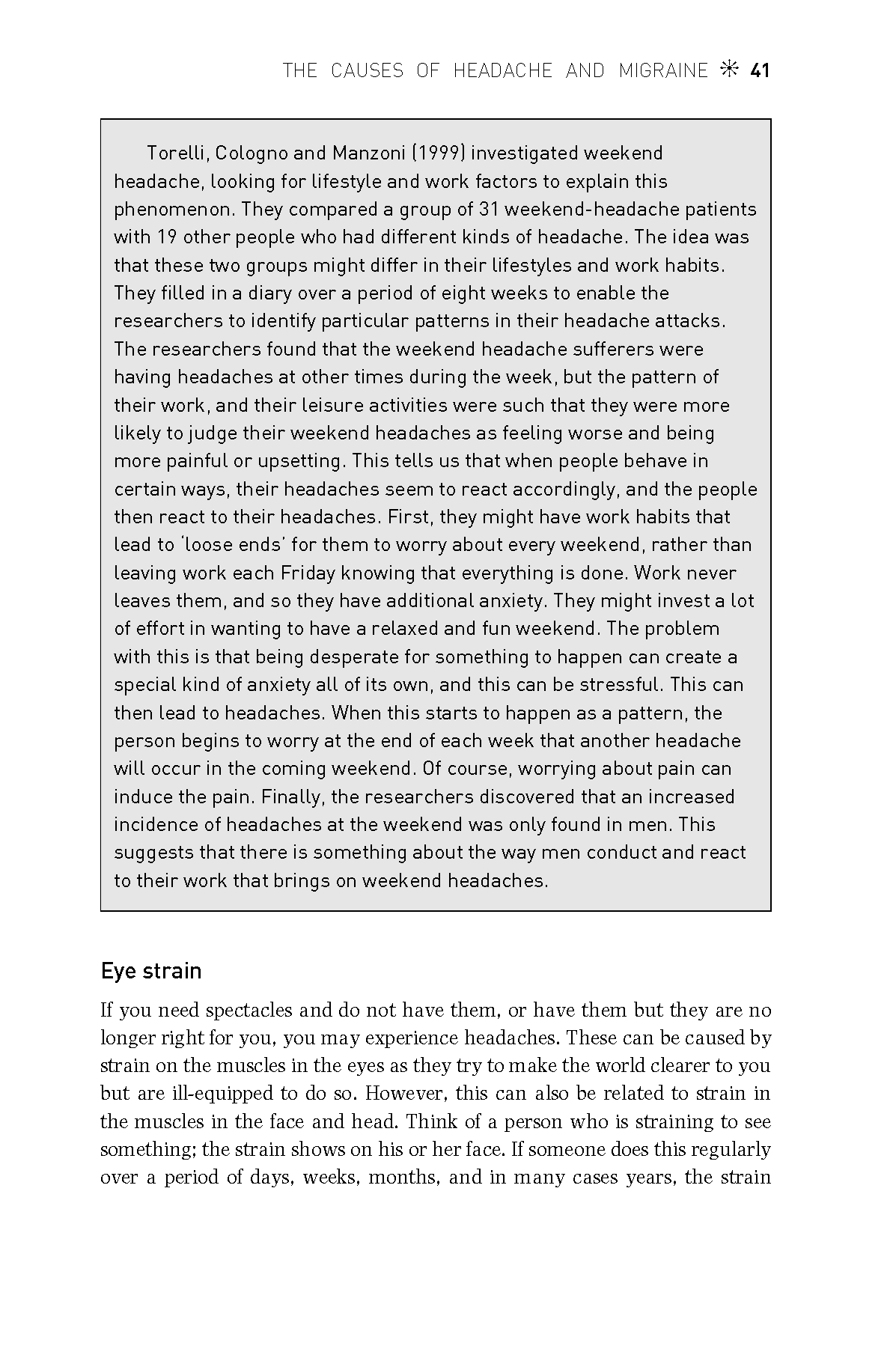UHAM058

THE CAUSES OF HEADACHE AND MIGRAINE * 41
Torelli, Cologno and Manzoni (1999) investigated weekend headache, looking for Lifestyle and work factors to explain this phenomenon. They compared a group of 31 weekend-headache patients with 19 other people who had different kinds of headache. The idea was that these two groups might differ in their lifestyles and work habits. They filled in a diary over a period of eight weeks to enable the researchers to identify particular patterns in their headache attacks.
The researchers found that the weekend headache sufferers were having headaches at other times during the week, but the pattern of their work, and their leisure activities were such that they were morę likely to judge their weekend headaches as feeling worse and being morę painful or upsetting. This tells us that when people behave in certain ways, their headaches seem to react accordingly, and the people then react to their headaches. First, they might have work habits that lead to Toose ends' for them to worry about every weekend, rather than leaving work each Friday knowing that everything is done. Work never leaves them, and so they have additional anxiety. They might invest a lot of effort in wanting to have a relaxed and fun weekend. The problem with this is that being desperate for something to happen can create a special kind of anxiety all of its own, and this can be stressful. This can then lead to headaches. When this starts to happen as a pattern, the person begins to worry at the end of each week that another headache will occur in the coming weekend. Of course, worrying about pain can induce the pain. Finally, the researchers discovered that an increased incidence of headaches at the weekend was only found in men. This suggests that there is something about the way men conduct and react to their work that brings on weekend headaches.
Eye strain
If you need spectacles and do not have them, or have them but they are no longer right for you, you may experience headaches. These can be caused by strain on the muscles in the eyes as they try to make the world clearer to you but are ill-equipped to do so. However, this can also be related to strain in the muscles in the face and head. Think of a person who is straining to see something; the strain shows on his or her face. If someone does this regularly over a period of days, weeks, months, and in many cases years, the strain
Wyszukiwarka
Podobne podstrony:
UHAM056 THE CAUSES OF HEADACHE AND MIGRAINE ^ 39 As a conseąuence, you become morę and morę dehydrat
UHAM054 4The causes of headache and migraineIn this chapter, some of the common and rare causes
UHAM060 THE CAUSES OF HEADACHE AND MIGRAINE ^ U2 wants to make your life worse with painkillers, and
UHAM062 THE CAUSES OF HEADACHE AND MIGRAINE ^ 45 genuinely intense, or if it is accompanied by other
UHAM066 THE CAUSES OF HEADACHE AND MIGRAINE ^ U9 Two of the most common headache-causing foods are c
UHAM068 THE CAUSES OF HEADACHE AND MIGRAINE ^ 51Diabetes Headaches can result from diabetes, because
UHAM070 THE CAUSES OF HEADACHE AND MIGRAINE * 53 HELPFUL TIPSHELPFUL TIPS! HELPFUL TIPS! HELPFUL Tak
UHAM064 THE CAUSES OF HEADACHE AND MIGRAINE ^ Ul However, the best method of avoiding it is consider
UHAM072 THE CAUSES OF HEADACHE AND MIGRAINE ^ 55 something similar, andwemayevenhavehadaheadache aft
UHAM037 20 * UNDERSTANDING HEADACHES AND M IG RAI N ES episodes in Life and the onset of a headache.
UHAM079 62 * UNDERSTANDING HEADACHES AND M IG RAI N ESPoints to notę • The consequ
więcej podobnych podstron